- Home
- Patrick Rothfuss
The Name of the Wind tkc-1 Page 15
The Name of the Wind tkc-1 Read online
Page 15
“N-no,” Chronicler stammered hastily. “I’m the one—it was my fault, I’m sorry.”
Bast shook his head. “You were just surprised, but you only tried to bind me.” His expression grew a little pained. “Not that it was pleasant, mind. It feels like being kicked between your legs, but all over your body. It makes you feel sick, and weak, but it’s just pain. It wasn’t like you’d actually wounded me.” Bast looked embarrassed. “I was going to do more than hurt you. I might have killed you before I even stopped to think.”
Before an uncomfortable silence developed, Chronicler said, “Why don’t we take his word that we were both suffering from blinding idiocy, and leave it at that?” Chronicler managed a sickly smile that was heartfelt in spite of the circumstances. “Peace?” he extended his hand.
“Peace.” They shook hands with much more genuine warmth than they had earlier. As Bast reached across the table his sleeve pulled back to reveal a bruise blossoming around his wrist.
Bast selfconsciously pulled his cuff back into place. “From when he grabbed me,” he said quickly. “He’s stronger than he looks. Don’t mention it to him. He’ll only feel bad.”
Kvothe emerged from the kitchen and shut the door behind himself. Looking around, he seemed surprised that it was a mild autumn afternoon rather than the springtime forest of his story. He lifted the handles of a flat-bottomed barrow and trundled it out into the woods behind the inn, his feet crunching in the fallen leaves.
Not too far into the trees was the winter’s wood supply. Cord on cord of oak and ash were stacked to make tall, crooked walls between the trunks of trees. Kvothe tossed two pieces of firewood into the wheelbarrow where they struck the bottom like a muted drum. Another two followed them. His motions were precise, his face blank, his eyes far away.
As he continued to load the barrow, he moved slower and slower, like a machine winding down. Eventually he stopped completely and stood for a long minute, still as stone. Only then did his composure break. And even with no one there to see, he hid his face in his hands and wept quietly, his body wracked with wave on wave of heavy, silent sobs.
CHAPTER EIGHTEEN
Roads to Safe Places
Perhaps the greatest faculty our minds possess is the ability to cope with pain. Classic thinking teaches us of the four doors of the mind, which everyone moves through according to their need.
First is the door of sleep. Sleep offers us a retreat from the world and all its pain. Sleep marks passing time, giving us distance from the things that have hurt us. When a person is wounded they will often fall unconscious. Similarly, someone who hears traumatic news will often swoon or faint. This is the mind’s way of protecting itself from pain by stepping through the first door.
Second is the door of forgetting. Some wounds are too deep to heal, or too deep to heal quickly. In addition, many memories are simply painful, and there is no healing to be done. The saying “time heals all wounds” is false. Time heals most wounds. The rest are hidden behind this door.
Third is the door of madness. There are times when the mind is dealt such a blow it hides itself in insanity. While this may not seem beneficial, it is. There are times when reality is nothing but pain, and to escape that pain the mind must leave reality behind.
Last is the door of death. The final resort. Nothing can hurt us after we are dead, or so we have been told.
After my family was killed, I wandered deep into the forest and slept. My body demanded it, and my mind used the first door to dull the pain. The wound was covered until the proper time for healing could come. In self-defense, a good portion of my mind simply stopped working—went to sleep, if you will.
While my mind slept, many of the painful parts of the previous day were ushered through the second door. Not completely. I did not forget what had happened, but the memory was dulled, as if seen through thick gauze. If I wanted to, I could have brought to memory the faces of the dead, the memories of the man with black eyes. But I did not want to remember. I pushed those thoughts away and let them gather dust in a seldom-used corner of my mind.
I dreamed, not of blood, glassy eyes, and the smell of burning hair, but of gentler things. And slowly the wound began to grow numb… .
I dreamed I was walking through the forest with plain-faced Laclith, the woodsman who had traveled with our troupe when I was younger. He walked silently through the underbrush while I kicked up more noise than a wounded ox dragging an overturned cart.
After a long period of comfortable silence I stopped to look at a plant. He came quietly up behind me. “Sagebeard,” he said. “You can tell by the edge.” He reached past me and gently stroked the appropriate part of the leaf. It did look like a beard. I nodded.
“This is willow. You can chew the bark to lessen pains.” It was bitter and slightly gritty. “This is itchroot, don’t touch the leaves.” I didn’t. “This is baneberry, the small fruits are safe to eat when red but never when shading from green to yellow to orange.
“This is how you set your feet when you want to walk silently.” It made my calves ache. “This is how you part the brush quietly, leaving no sign of your passing. This is where you find the dry wood. This is how you keep the rain off when you don’t have canvas. This is paterroot. You can eat it but it tastes bad. These,” he gestured, “straightrod, orangestripe, never eat them. The one with little knobs on it is burrum. You should only eat it if you have just eaten something like straightrod. It will make you keck up whatever’s in your stomach.
“This is how you set a snare that won’t kill a rabbit. This snare will.” He looped the string first one way, then another.
As I watched his hands manipulate the string I realized it was no longer Laclith, but Abenthy. We were riding in the wagon and he was teaching me how to tie sailors’ knots.
“Knots are interesting things,” Ben said as he worked. “The knot will either be the strongest or the weakest part of the rope. It depends entirely on how well one makes the binding.” He held up his hands, showing me an impossibly complex pattern spread between his fingers.
His eyes glittered. “Any questions?”
“Any questions?” my father said. We had stopped early for the day because of a greystone. He sat tuning his lute and was finally going to play his song for my mother and me. We had been waiting so long. “Are there any questions?” he repeated, as he sat with his back against the great grey stone.
“Why do we stop at the waystones?”
“Tradition mostly. But some people say they marked old roads—” My father’s voice changed and became Ben’s voice, “—safe roads. Sometimes roads to safe places, sometimes safe roads leading into danger.” Ben held one hand out to it, as if feeling the warmth of a fire. “But there is a power in them. Only a fool would deny that.”
Then Ben was no longer there, and there was not one standing stone, but many. More than I had ever seen in one place before. They formed a double circle around me. One stone was set across the top of two others, forming a huge arch with thick shadow underneath. I reached out to touch it… .
And awoke. My mind had covered a fresh pain with the names of a hundred roots and berries, four ways to light a fire, nine snares made from nothing but a sapling and string, and where to find fresh water.
I thought very little on the other matter of the dream. Ben had never taught me sailors’ knots. My father had never finished his song.
I took inventory of what I had with me: a canvas sack, a small knife, a ball of string, some wax, a copper penny, two iron shims, and Rhetoric and Logic, the book Ben had given me. Aside from my clothes and my father’s lute, I had nothing else.
I set out looking for drinking water. “Water comes first,” Laclith had told me. “Anything else you can do without for days.” I considered the lay of the land and followed some animal trails. By the time I found a small spring-fed pool nestled among some birch trees, I could see the sky purpling into dusk behind the trees. I was terribly thirsty, but caution won out and
I took only a small drink.
Next I collected dry wood from the hollows of trees and under canopies. I set a simple snare. I hunted for and found several stalks of motherleaf and spread the sap onto my fingers where they were bloody and torn. The stinging helped distract me from remembering how I had hurt them.
Waiting for the sap to dry, I took my first casual look around. Oaks and birches crowded each other for space. Their trunks made patterns of alternating light and dark beneath the canopy of branches. A small rivulet ran from the pool across some rocks and away to the east. It may have been beautiful, but I didn’t notice. I couldn’t notice. To me the trees were shelter, the undergrowth a source of nourishment, and the pool reflecting moonlight only reminded me of my thirst.
There was also a great rectangular stone lying on its side near the pool. A few days earlier I would have recognized it as a greystone. Now I saw it as an efficient windbreak, something to put my back against as I slept.
Through the canopy I saw the stars were out. That meant it had been several hours since I had tried the water. Since it hadn’t made me sick, I decided it must be safe and took a long drink.
Rather than refreshing me, all my drink did was make me aware of how hungry I was. I sat on the stone by the edge of the pool. I stripped the leaves from the stalks of motherleaf and ate one. It was rough, papery, and bitter. I ate the rest, but it didn’t help. I took another drink of water, then lay down to sleep, not caring that the stone was cold and hard, or at least pretending not to care.
I awoke, took a drink, and went to check the snare I had set. I was surprised to find a rabbit already struggling against the cord. I took out my small knife and remembered how Laclith had shown me to dress a rabbit. Then I thought of the blood and how it would feel on my hands. I felt sick and vomited. I cut loose the rabbit and walked back to the pool.
I took another drink of water and sat on the stone. I felt a little lightheaded and wondered if it was from hunger.
After a moment my head cleared and I chided myself for my foolishness. I found some shelf fungus growing on a dead tree and ate it after washing it in the pool. It was gritty and tasted like dirt. I ate all I could find.
I set a new snare, one that would kill. Then, smelling rain in the air, I returned to the greystone to make a shelter for my lute.
CHAPTER NINETEEN
Fingers and Strings
In the beginning I was almost like an automaton, thoughtlessly performing the actions that would keep me alive.
I ate the second rabbit I caught, and the third. I found a patch of wild strawberries. I dug for roots. By the end of the fourth day, I had everything I needed to survive: a stone-lined fire pit, a shelter for my lute. I had even assembled a small stockpile of foodstuffs that I could fall back on in case of emergency.
I also had one thing I did not need: time. After I had taken care of immediate needs, I found I had nothing to do. I think this is when a small part of my mind started to slowly reawaken itself.
Make no mistake, I was not myself. At least I was not the same person I had been a span of days before. Everything I did I attended to with my whole mind, leaving no part of me free for remembering.
I grew thinner and more ragged. I slept in rain or sun, on soft grass, moist earth, or sharp stones with an intensity of indifference that only grief can promote. The only notice I took of my surroundings was when it rained, because then I could not bring out my lute to play, and that pained me.
Of course I played. It was my only solace.
By the end of the first month, my fingers had calluses hard as stones and I could play for hours upon hours. I played and played again all of the songs I knew from memory. Then I played the half-remembered songs as well, filling in the forgotten parts as best I could.
Eventually I could play from when I woke until the time I slept. I stopped playing the songs I knew and started inventing new ones. I had made up songs before; I had even helped my father compose a verse or two. But now I gave it my whole attention. Some of those songs have stayed with me to this day.
Soon after that I began playing … how can I describe it?
I began to play something other than songs. When the sun warms the grass and the breeze cools you, it feels a certain way. I would play until I got the feeling right. I would play until it sounded like Warm Grass and Cool Breeze.
I was only playing for myself, but I was a harsh audience. I remember spending nearly three whole days trying to capture Wind Turning a Leaf.
By the end of the second month, I could play things nearly as easily as I saw and felt them: Sun Setting Behind the Clouds, Bird Taking a Drink, Dew in the Bracken.
Somewhere in the third month I stopped looking outside and started looking inside for things to play. I learned to play Riding in the Wagon with Ben, Singing with Father by the Fire, Watching Shandi Dance, Grinding Leaves When it Is Nice Outside, Mother Smiling… .
Needless to say, playing these things hurt, but it was a hurt like tender fingers on lute strings. I bled a bit and hoped that I would callous soon.
Toward the end of summer, one of the strings broke, broke beyond repair. I spent the better part of the day in a mute stupor, unsure of what to do. My mind was still numb and mostly asleep. I focused with a dim shadow of my usual cleverness on my problem. After realizing that I could neither make a string nor acquire a new one, I sat back down and began to learn to play with only six strings.
In a span I was nearly as good with six strings as I had been with seven. Three span later I was trying to play Waiting While it Rains when a second string broke.
This time I didn’t hesitate, I stripped off the useless string and started to learn again.
It was midway through Reaping when the third string broke. After trying for nearly half a day, I realized that three broken strings were too many. So I packed a small dull knife, half a ball of string, and Ben’s book into a tattered canvas sack. Then I shouldered my father’s lute and began to walk.
I tried humming Snow Falling with the Late Autumn Leaves; Calloused Fingers and a Lute With Four Strings, but it wasn’t the same as playing it.
My plan was to find a road and follow it to a town. I had no idea how far I was from either, in which direction they might lie, or what their names might be. I knew I was somewhere in the southern Commonwealth, but the precise location was buried, tangled up with other memories that I was not eager to unearth.
The weather helped me make up my mind. Cool autumn was turning to winter’s chill. I knew the weather was warmer to the south. So, lacking any better plan, I set the sun on my left shoulder and tried to cover as much distance as I could.
The next span was an ordeal. The little food I’d brought with me was soon gone, and I had to stop and forage when I was hungry. Some days I couldn’t find water, and when I did I had nothing I could use to carry it. The small wagon track joined a bigger road, which joined a larger road yet. My feet chafed and blistered against the insides of my shoes. Some nights were bitter cold.
There were inns, but aside from the occasional drink I stole from horse troughs, I gave them a wide berth. There were a few small towns as well, but I needed someplace larger. Farmers have no need for lute strings.
At first, whenever I heard a wagon or a horse approaching I found myself limping off to hide by the side of the road. I had not spoken with another human since the night my family was killed. I was more akin to a wild animal than a boy of twelve. But eventually the road became too large and well traveled, and I found myself spending more time hiding than walking. I finally braved the traffic and was relieved when I was largely ignored.
I had been walking for less than an hour one morning when I heard a wagon coming up behind me. The road was wide enough for two wagons to run abreast, but I moved to the grass at the edge of the road anyway.
“Hey, boy!” a rough male voice behind me yelled. I didn’t turn around. “Hullo, boy!”
I moved farther off the road into the grass without looking be
hind me. I kept my eyes on the ground beneath my feet.
The wagon pulled slowly alongside me. The voice bellowed twice as loud as before, “Boy. Boy!”
I looked up and saw a weathered old man squinting against the sun. He could have been anywhere from forty to seventy years old. There was a thick-shouldered, plain-faced young man sitting next to him on the wagon. I guessed they were father and son.
“Are ye deaf, boy?” The old man pronounced it deef.
I shook my head.
“Ye dumb then?”
I shook my head again. “No.” It felt strange talking to someone. My voice sounded odd, rough and rusty from disuse.
He squinted at me. “You goin’ into the city?”
I nodded, not wanting to talk again.
“Get in then.” He nodded toward the back of the wagon. “Sam won’t mind pulling a little whippet like yuself.” He patted the rump of his mule.
It was easier to agree than run away. And the blisters on my feet were stinging from the sweat in my shoes. I moved to the back of the open cart and climbed on, pulling my lute after me. The back of the open wagon was about three-quarters full of large burlap bags. A few round, knobby squash had spilled from an open sack and were rolling aimlessly around on the floor.
The old man shook the reins. “Hup!” and the mule grudgingly picked up its pace. I picked up the few loose squash and tucked them into the bag that had fallen open. The old farmer gave me a smile over his shoulder. “Thanks, boy. I’m Seth, and this here is Jake. You might want to be sittin’ down, a bad bump could tip ye over the side.” I sat on one of the bags, tense for no good reason, not knowing what to expect.
The old farmer handed the reins to his son and brought a large brown loaf of bread out of a sack that sat between the two of them. He casually tore off a large chunk, spread a thick dab of butter onto it, and handed it back to me.

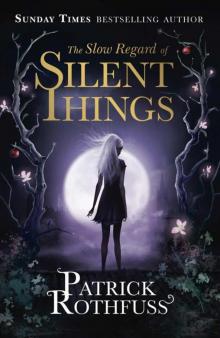 The Slow Regard of Silent Things
The Slow Regard of Silent Things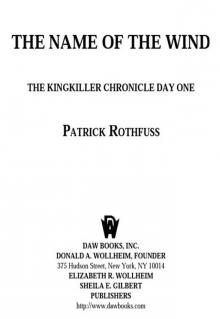 The Name of the Wind
The Name of the Wind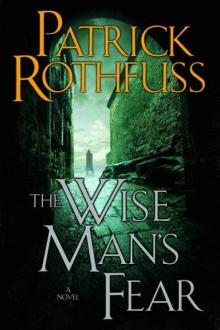 The Wise Man's Fear
The Wise Man's Fear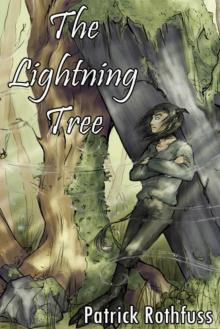 The Lightning Tree
The Lightning Tree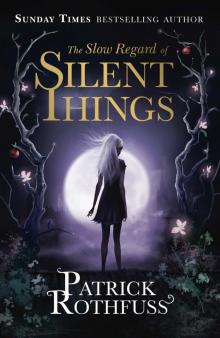 The Slow Regard of Silent Things: A Kingkiller Chronicle Novella (The Kingkiller Chronicle)
The Slow Regard of Silent Things: A Kingkiller Chronicle Novella (The Kingkiller Chronicle)![Kingkiller Chronicle [01] The Name of the Wind Read online](http://i1.bookreadfree.com/i/03/24/kingkiller_chronicle_01_the_name_of_the_wind_preview.jpg) Kingkiller Chronicle [01] The Name of the Wind
Kingkiller Chronicle [01] The Name of the Wind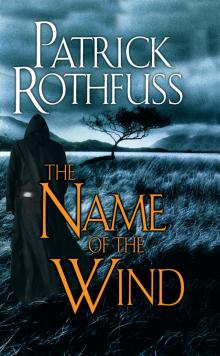 The Name of the Wind tkc-1
The Name of the Wind tkc-1